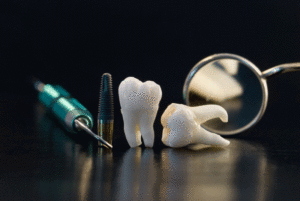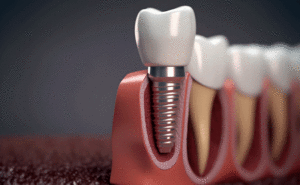Taking care of your oral health is essential for several reasons, far beyond just keeping your teeth in good shape. For instance, did you know that last year, researchers found a link between gum disease and Alzheimer’s? What’s the link, and how can you lower your risk of both gum disease and dementia? Let’s take a look.
What Is Gum Disease?
Periodontal disease occurs when your gums develop an infection, usually from failing to brush or floss properly. It begins with a film of bacteria that builds up on the teeth, called plaque. That plaque causes an inflammation of the gums, called gingivitis.
Gingivitis is fairly common and treatable. However, if left unchecked, it can turn into a more serious disease called periodontitis. Periodontitis can lead to damage, not only to the gums, but to the bones underneath. It can damage your teeth and ultimately cause you to lose them entirely.
How Is Gum Disease Linked to Alzheimer’s?
The link between your mouth’s health and your brain’s health has been studied by scientists for years. However, in 2019, a study was released showing a specific link between gum disease and Alzheimer’s.
Doctors have observed that gingivitis is more common in Alzheimer’s patients, and that those with periodontal disease sometimes experience a faster decline in mental capabilities. This could simply be because good oral hygiene becomes more difficult for patients as their mental health declines. However, experiments showed that mice infected with gum disease did, in fact, display signs of mental deterioration later on.
How Can You Prevent Gum Disease?
Whether or not gum disease will increase your risk of dementia, it’s still important to keep a healthy mouth. There are a number of things you can do to prevent periodontal disease, including:
- Brush twice a day, for two to three minutes.
- Brush not just your teeth, but also along the gumline.
- Floss daily to remove plaque.
- Rinse your mouth with mouthwash, to kill bacteria, and reduce plaque by up to 20 percent.
- Eat healthy and get plenty of vitamins A and C, which strengthen teeth and prevent gum disease.
- Go to the dentist every six months to check on your oral health and spot signs of periodontal disease early.
What to Do If You Have Symptoms of Gum Disease
Even if you do get gum disease, it’s not the end of the world. Over half of Americans over 30 get gingivitis. As long as you spot it early, it’s completely treatable. If you notice that you’re bleeding when you brush or floss, or that your gums are tender, swollen, painful, or inflamed, there are a few things you can do.
Switch to a soft-bristled toothbrush, which will be easier on your gums and reduce pain and bleeding. You might also invest in an electric toothbrush, which can help you clean your teeth and gums more thoroughly. Sometimes, simple improvements in oral hygiene can cause your gingivitis to clear up on its own.
If symptoms persist, however, get to the dentist as soon as possible. They can give you a deeper cleaning to eliminate bacteria underneath the gumline. They may also prescribe you antibiotics or another medication to get rid of the infection.
Taking care of your mouth now can prevent a number of problems as you get older, besides just dementia. Getting into good dental hygiene habits early, and knowing how to spot and take care of potential problems, can save you a lot of trouble down the road and make you healthier in both body and mind. What steps will you take to improve your oral health?
For more information on gum disease and ways to keep your gums healthy contact Caven Dental today.



